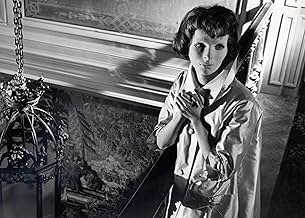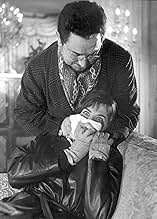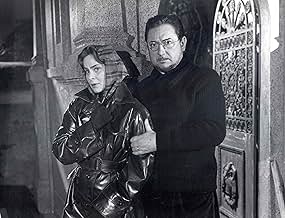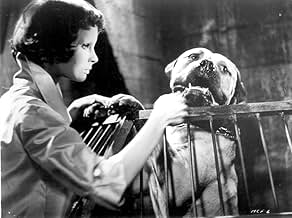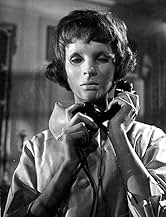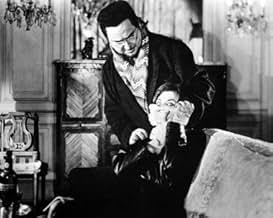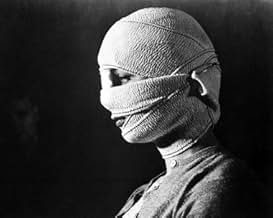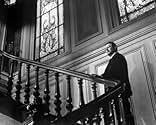IMDb RATING
7.6/10
38K
YOUR RATING
A surgeon causes a car accident which leaves his daughter disfigured and goes to extreme lengths to give her a new face.A surgeon causes a car accident which leaves his daughter disfigured and goes to extreme lengths to give her a new face.A surgeon causes a car accident which leaves his daughter disfigured and goes to extreme lengths to give her a new face.
Charles Blavette
- L'homme de la fourrière
- (scenes deleted)
- (as Blavette)
Charles Bayard
- Un homme à la conférence
- (uncredited)
7.638.4K
1
2
3
4
5
6
7
8
9
10
Featured reviews
Poetic Horror
Georges Franju's version of a mad scientist trying to play God tells about a brilliant but controlling and obsessive doctor who is trying to restore the face of his own beloved daughter that was horribly disfigured in a car accident caused by his reckless driving. He requires tissues of recently deceased young women that look like his daughter and he is not going to wait for them to die in an accident - he creates the accidents with help of his loyal secretary/nurse/lover/former patient Louise (Alida Valli of "The Third Man") who kidnaps the unsuspecting girls and brings them to the secluded mansion in one of Paris's suburbs where Doctor Génessier is ready to perform the fascinating and horrifying surgeries.
"Eyes without a Face" is a very impressive, classy picture that has inspired many later horror movies. The music by Maurice Jarr adds to the uneasy and creepy atmosphere - it makes you feel like on the never-stopping ominous merry-go-round and you can't get off it.
"Eyes without a Face" is a very impressive, classy picture that has inspired many later horror movies. The music by Maurice Jarr adds to the uneasy and creepy atmosphere - it makes you feel like on the never-stopping ominous merry-go-round and you can't get off it.
Dark, desolate and diverting
This film is dark and somber with a spare, eerie music score that suits perfectly the macabre, surreal story. A brilliant but deranged surgeon, having caused his daughter's disfigurement in a car accident, loses touch with reality and tries to restore her beauty in a most repulsive manner. Undeterred by failure, the mad doctor continues his gruesome work, hoping to find a miracle cure that will reconstruct the girl's facial features and also relieve him of his tremendous burden of guilt. The once-lovely girl realizes that she will never enjoy a normal life or see her beloved fiancé again, and her mute telephone calls to him just to hear his voice show how empty and lonely her life has become. There are some scenes that are horribly graphic but quite well done and a few moments that are poignant and touching amid the cruelty and butchery of the movie's central theme. Each character in this grim, unhappy feature is victimized in some fashion, but in spite of its subject matter, this cult classic is lean, first-rate storytelling.
Another opinion:
"Eyes Without A Face" is a groundbreaking and trendsetting artistic nightmare! The plot of this film has often been copied but never has it been done in such an eerily effective style. The sight of the masked daughter playing with the dogs evokes many emotions in the viewer. There are shots in this movie that will stay with you long after you have seen it! Heavily recommended!
Horror Classic
A brilliant surgeon, Dr. Génessier, helped by his assistant Louise, kidnaps nice young women. He removes their faces and tries to graft them onto the head on his beloved daughter Christiane, whose face has been entirely spoiled in a car crash.
The mask was really good. The way it is blank, but clearly fits to the contours of her face... it completely destroys her identity, makes it like she does not even exist as a person. I would not go so far as to say she looks worse with it on than off, but it makes her less than human for sure.
While some of the story is a bit slow, it is overall a quite strong story... part horror, part drama and part detective story. I am not surprised that many horror historians consider it among the greatest films ever made in the genre.
The mask was really good. The way it is blank, but clearly fits to the contours of her face... it completely destroys her identity, makes it like she does not even exist as a person. I would not go so far as to say she looks worse with it on than off, but it makes her less than human for sure.
While some of the story is a bit slow, it is overall a quite strong story... part horror, part drama and part detective story. I am not surprised that many horror historians consider it among the greatest films ever made in the genre.
Masterpiece of the genre
George Franju's "Yeux Sans Visage" is extremely slow yet absolutely riveting. The direction is masterful and Pierre Brasseur is superb as the dedicated doctor whose love for his daughter leads him to commit unspeakable crimes.
The cold, sinister atmosphere of the film will seep into your bones and you may find it hard to look at the screen when the central skin-removal operation takes place - this is an extraordinarily grisly sequence for its time, lent all the more power by the cold, matter-of-fact direction and acting.
In a film full of haunting images, you will find the last one unforgettable.
Why can't modern directors make horror films as good as this? It deals with a potentially lurid, gory subject-matter with masterly subtlety and skill.
The cold, sinister atmosphere of the film will seep into your bones and you may find it hard to look at the screen when the central skin-removal operation takes place - this is an extraordinarily grisly sequence for its time, lent all the more power by the cold, matter-of-fact direction and acting.
In a film full of haunting images, you will find the last one unforgettable.
Why can't modern directors make horror films as good as this? It deals with a potentially lurid, gory subject-matter with masterly subtlety and skill.
Did you know
- TriviaDuring the original release of the film in the UK in 1960, an English film critic for "The Spectator" was nearly fired for writing a positive review of it after the general critical reaction to it had been negative.
- GoofsWhen she is not wearing it, Christiane's mask is very thick and heavy and would only seem to cover her face. When she puts it on, however, it is very thin, close-fitting, and seamlessly covers her jawline and the underside of her chin, revealing that the mask itself is a prop while the actress probably wears a combination of makeup and prosthetics.
- Quotes
Christiane Génessier: My face frightens me. My mask frightens me even more.
- Alternate versionsThe film's original release in the U.S. in 1962 was dubbed in English, edited and re-titled "The Horror Chamber of Dr. Faustus". The surgery scene was edited for content, while any and all scenes that made Dr. Genessier seem to be sympathetic (particularly the scene where he cares for a sick boy) were cut.
- ConnectionsFeatured in Cinéma, de notre temps: Georges Franju, le visionnaire (1996)
- How long is Eyes Without a Face?Powered by Alexa
Details
- Release date
- Countries of origin
- Language
- Also known as
- Los ojos sin cara
- Filming locations
- Production companies
- See more company credits at IMDbPro
Box office
- Gross US & Canada
- $58,565
- Opening weekend US & Canada
- $19,628
- Nov 2, 2003
- Gross worldwide
- $62,793
- Runtime
- 1h 30m(90 min)
- Color
- Aspect ratio
- 1.66 : 1
Contribute to this page
Suggest an edit or add missing content

![Watch Tráiler [OV]](https://m.media-amazon.com/images/M/MV5BOGQ0MzNjNTYtYTViNC00NjVjLWI2MDEtYTczMzJjMTZlZDUwXkEyXkFqcGdeQXRyYW5zY29kZS13b3JrZmxvdw@@._V1_QL75_UY281_CR0)
